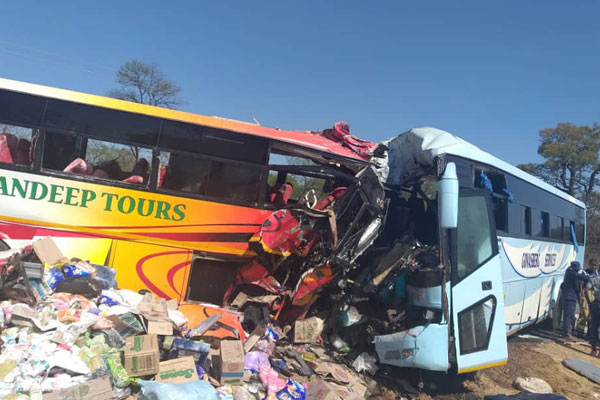
BY JAIROS SAUNYAMA
In 2015, government passed Statutory Instrument (SI) 129 of 2015 ordering the installation of speed governors or tracking systems in all public passengers carrying vehicles in a move meant to curb the road carnage.
The major cause of road accidents in Zimbabwe is human error at 90% and speeding.
Section 64 (2) of the SI, demands that public passenger carrying vehicles shall not be driven on the roads unless such a vehicle is fitted with a speed monitoring or speed limiting device.
However, five years down the line, there is no implementation of the law on public motor vehicles with the nation still grappling with horrific road accidents.
“The responsible authorities should act fast on the issue of speed governors,” said Talkmore Matope a commuter omnibus driver, who plies the Harare-Mutare highway.
“For example, on the Harare-Mutare Highway, we have the buses that can overtake a Mercedes Benz travelling at more than 110km/h.
“There is need to govern these speeds for the safety of the passengers since most of them will be overloaded.”
- Chamisa under fire over US$120K donation
- Mavhunga puts DeMbare into Chibuku quarterfinals
- Pension funds bet on Cabora Bassa oilfields
- Councils defy govt fire tender directive
Keep Reading
Last year along the Harare-Mutare Highway, about 50 people died following a head-on collision involving Boltcutter and Smart Express buses near Rusape.
According to eye-witnesses, both buses were travelling at high speed.
Since attaining independence Zimbabwe has experienced horrific road accidents that were all attributed to speeding.
These include the Regina Coeli (1980), Chivake Bridge, Dzivarasekwa, Masvingo Teachers College/Mhunga, Megalink and King Lion bus disasters, just to mention a few.
Other fatal crashes involving commuter omnibuses include the Kwekwe national disaster (March 3, 2016), which killed 31 people and injured 36 as well as the head-on collision between a Toyota Hiace and a Mitsubishi Colt (April 2, 2016), which occurred near Gweru and killed 10 people, while 13 others were injured.
Traffic Safety Council of Zimbabwe corporate communications manager Tatenda Chinoda said apart from implementing the SI, there was need to amend it so that each passenger-carrying vehicle can have its speed governed.
“We advocate for the fitting of speed limit devices or governors on all public service vehicles as a priority,” Chinoda said.
“Therefore, the law must hastily be amended to demand fitting of speed governors as part of the fitness test for such a vehicle.
“Thus, no public service vehicle will pass a fitness test unless it is fitted with a speed governor.
“Installing speed governors in public passenger carrying vehicles will mean no-more investment in speed cameras for such type of vehicles.
“Speeding is the highest risk factor in road traffic fatalities both locally and globally.
“It contributes to more than 50% of our fatalities in Zimbabwe.
“Thus, speed governors must be installed in all public service vehicles as a preventive measure. Prevention is best.”
Other countries that have successfully implemented the use of speed governors are Rwanda, which has since recorded a decline in deaths caused by road accidents.
An average of 2 000 people are perishing on Zimbabwe’s roads annually with the peak being recorded during the festive season.
Greater Harare Association of Commuter Operators Association (GHACO) secretary-general Ngoni Katsvairo said although there was need to implement the installation of speed governors on PSVs, the much-needed results will not be yielded as most travellers were now resorting to pirate taxis and private cars due to the bad economy.
“It certainly is, but not a panacea given the state of the economy where everyone is now a passenger carrier with their own vehicle,” Katsvairo said.
“Even if the installation of speed governors was implemented and effected it would also need enforcement.
“We may target public service vehicles, but the truth of the matter is that more passengers are now being ferried by pirate taxis and private vehicles, especially on major highways.
“According to latest statistics, more people are killed in road accidents involving pirate taxis compared to public transporters. We really need to start serious law making and enforcement on private motorists, who are abusing the lack of clear laws on their pirate systems.”
Transport and Infrastructure Development minister Joel Biggie Matiza recently said the government would enforce the SI through compelling the police to lead in the installation of speed governors on all PSVs.
He added that traffic police have rebranded and that an integrated transport management system shall ensure that all road traffic law enforcement becomes effective.
In Rwanda, the hi-tech device limits vehicles to a maximum speed of 60km/hr and has the capacity to trim down the speed to 25km/hr every time the vehicle attempts to exceed the set maximum velocity.
It also has a storage computer, which allows controllers or traffic offices to check the previous speed of the vehicle and errors if the device was tempered with.
Abnormal load escort expert Emmanuel Machikwa said there was need to control the speed of public transporters on major highways to prevent carnage.
“Speeding remains the main cause of road accidents in Zimbabwe,” Machikwa said.
“This is so because in case of sudden distraction like stray animals, reaction is compromised.
“Moreover, the chances of surviving a tyre burst are very low when a loaded vehicle is travelling at above 100km/hr.
“The installation of speed limits will go a long way in keeping drivers at check particularly public transporters.”
With the country good at formulating noble traffic law enforcement laws, it is the implementation stage that has hindered the yielding of the desired results as far as reducing road deaths is concerned.










